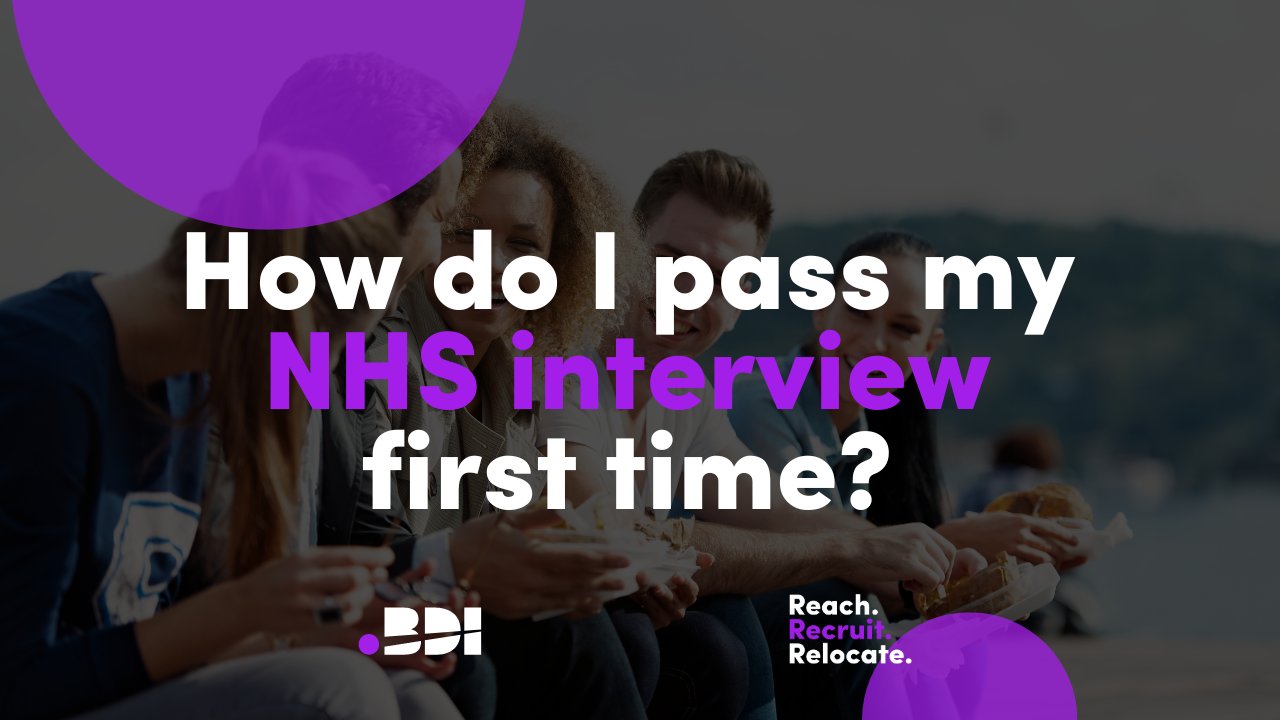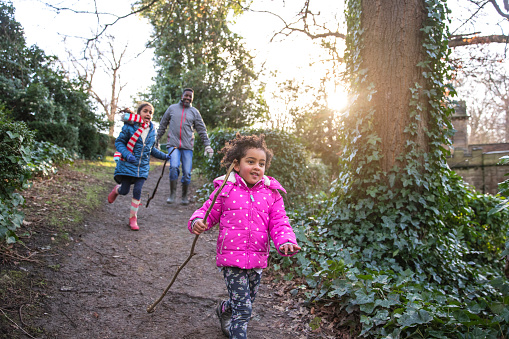NHS Interview Preparation
16 January, 2024Preparation for your NHS interview is very important to ensure you succeed in securing your next role. This video breaks down the key elements of a ...
Preparation for your NHS interview is very important to ensure you succeed in securing your next role. This video breaks down the key elements of a successful NHS interview and provides invaluable tips to for researching the Trust, asking questions and what to do on the day.
00:07 Introduction
01:01 What Research should I do?
03:38 Preparing Examples
04:59 Interview Questions
08:22 Summary
NHS Interview Preparation
00:07 If you found this video.
00:08 My assumption is that you're a doctor looking
00:10 for their next role in the NHS.
00:12 It might be your first role if you're an international
00:15 doctor coming in from overseas, or it may be an
00:17 ongoing role if you're a UK based doctor.
00:20 I'm one of the directors of BDI Resourcing,
00:23 and my business has helped over
00:25 3000 doctors find roles within the NHS.
00:28 So we've hosted interviews.
00:30 For most of those, we're either sat in on
00:32 the panel, in the team's links, or alternatively, we
00:36 gather the feedback and the debriefs after the interviews.
00:39 So that puts us in a really good position to
00:41 be able to provide you with some insight and knowledge
00:44 about what to expect in an NHS interview.
00:47 This video is going to be about some top tips.
00:49 We're not going to go into the specific questions
00:51 that you might get asked, but some tips on
00:52 how to prepare for an NHS interview.
01:00 So you've been invited for your NHS interview.
01:03 Very exciting news, and you're probably already anticipating what
01:07 kind of questions you're going to get asked.
01:09 Well, the most important thing to do is to do some
01:11 research first, and that might give you a few clues as
01:13 to what to expect in terms of the interview questions.
01:17 You're going to want to start that
01:18 research thinking about the hospital itself.
01:21 So take a look at the vision and the values of
01:24 the hospital that you are potentially going to be working in,
01:27 if you can learn a bit more about those.
01:29 NHS interviews are often focused around
01:31 what they call value based recruitment.
01:34 So they're going to test you on the vision and
01:36 values of the trust and then put that into a
01:38 context of maybe a clinical or an ethical scenario and
01:41 how you would apply those values to your work.
01:43 So do some research on the vision and values
01:45 of the trust you're going to work for.
01:47 These are easily available online.
01:49 A very simple starting point for you to have a look at.
01:52 The next thing to do some
01:53 research on is the department itself.
01:56 Most NHS job descriptions will give you a really
01:59 good idea of the facilities, the type of department,
02:02 the number of consultants, the specialist fields that they
02:05 cover, even the number of middle grades and junior
02:07 doctors, the nursing support, everything you would need to
02:10 know about the department.
02:11 And again, that's a really important thing to note,
02:13 because if you're coming from a very similar hospital,
02:16 it gives you the opportunity to provide similar examples.
02:19 And equally, if you're coming from a different background or
02:21 setting, it gives you an opportunity to recognise that and
02:24 equally be able to show that you are prepared and
02:27 ready to work in the new setting.
02:29 You're also going to want to think about
02:31 the role itself, the actual specifics of the
02:33 job, for exactly the same reason.
02:35 It might be very similar to the job you're doing,
02:37 or there might be some differences that you want to
02:39 highlight to show that you're prepared for that.
02:41 So think about the job description, the rota, the on call
02:45 commitments, anything you can find in the job description, and have
02:48 a bit of an analysis of what you're doing now versus
02:51 what the new role is going to entail.
02:54 You're also going to want to
02:55 think about the interview panel.
02:56 So normally this will be included in your TRAC link, or
03:00 if you're sent a teams invite, you'll be able to see
03:02 who's going to be a part of the panel, do a
03:04 little bit of research into them, look them up on LinkedIn,
03:07 find out a bit more about their background, their history.
03:09 Again, it's all readily available information
03:12 and it's going to help you.
03:13 If nothing else, knowing what the panel looked like
03:16 and seeing their faces ahead of the interview might
03:18 just make you feel a little bit more comfortable
03:20 once you arrive in the interview setting.
03:22 So background research is the first step
03:26 in preparing for your NHS interview.
03:28 Do as much as you can, learn as
03:30 much as you can, and you will feel
03:31 more comfortable, more confident and more prepared.
03:39 So now that you've done your research into the
03:41 trust, the department, the values, the vision, the job
03:45 itself, the job role, and the interview panel, you're
03:47 going to want to think back to your application,
03:50 your CV, and any examples that you can prepare
03:53 that will relate well to those.
03:55 So the first starting point is to have a good read
03:58 through your cv and maybe just drill down on a few
04:00 of the things that perhaps you said vaguely or you made
04:04 some summaries of but didn't go into full depth.
04:07 The reason for this is that you're
04:09 going to need examples throughout your interview.
04:12 It's no use saying I can do that, I can do the other.
04:15 You're going to need to
04:16 exemplify everything that you say.
04:18 So go back through and think about your experience.
04:21 Maybe you've had good examples of patient interactions or
04:24 clinical scenarios and relate this back to the job
04:27 that you're applying for the role, the details that
04:29 we have already done the research on.
04:31 So if you know that you're going to be working
04:33 in a very busy setting on call is going to
04:36 be a big part of the job, then perhaps you
04:38 want to think about how you cope with a busy,
04:40 stressful environment and that kind of thing and give examples
04:43 of where that's been the case throughout your career.
04:45 So think about your application, your CV , and
04:49 any examples that you can prepare from your
04:50 background and your history and relate those back
04:53 to the research that you've done.
05:00 The next step in preparing for your interview is to
05:03 think about the questions that you might be asked.
05:06 Now, we've got a really useful tool for this on
05:09 our website, which you can go on and download.
05:11 We have six different speciality specific interview
05:14 guides where we've compiled over 50 questions
05:17 in each guide, with clinical scenarios, ethical
05:21 scenarios, biographical questions, questions to ask at
05:24 the end of the interview.
05:25 and questions about your future aspirations.
05:27 These are real life interview questions that have
05:30 been taken from the thousands of interviews that
05:32 we've been a part of as BDI Resourcing.
05:35 And as I say, they are speciality specific.
05:37 So we have them for paediatrics medicine,
05:39 radiology, anaesthetics, pathology and emergency medicine too.
05:44 So get on the website, we'll post a link
05:46 and download one of those guides for some real
05:49 life interview questions that you can practise.
05:52 I think practising your clinical scenarios is arguably one of
05:56 the most important things, and that's where we see a
05:59 lot of candidates maybe letting themselves down or failing on
06:02 areas where they just need to brush up on the
06:05 exact protocols, the exact processes, or if they're coming from
06:08 overseas, maybe think about what the NHS processes are and
06:12 brush up on how things are done.
06:13 Here to make sure that they're given the
06:15 right answers to those ethical scenarios as well
06:18 is another one that's really important.
06:20 And a lot of the time people
06:21 don't think about preparing answers for those.
06:24 But actually so important, if you can exemplify some
06:26 of the areas where you've thought about the seven
06:29 pillars of clinical governance and brushing up on things
06:32 like that, they can be so important, so integral.
06:35 So download the interview guides that we've got.
06:37 I think that's a great starting
06:38 point for some obvious those questions.
06:40 But again, think back to the research you've done on
06:43 the job itself, on the role, and think what kind
06:45 of questions are going to come up based on that?
06:48 You can usually prepare your own questions and
06:51 then practise the answers, practise the examples that
06:53 you're going to give as part of those.
07:01 So if you've secured your interview through BDI Resourcing,
07:04 you'll meet with one of your recruiters for around
07:07 an hour long interview preparation call ahead of your
07:11 interview that's done over Microsoft Teams.
07:13 And whether you're interviewing with BDI Resourcing or directly
07:16 and doing it yourself, we really do recommend setting
07:19 up a practise interview ahead of your real life
07:22 interview, first and foremost, and if for no other
07:25 reason than this, you need to test the connection.
07:28 So use the device that you're going to be using
07:30 on the day, ideally in the location that you'll be
07:32 using it so the Internet connection is good enough.
07:35 There's no problems with the sound,
07:36 there's no problems with video.
07:37 Your device is set up and working properly, but it
07:41 also allows you to put yourself in that scenario.
07:43 Perhaps wear what you're going to wear on the day.
07:46 Get your friend or your colleague to ask
07:48 you some of the interview questions that you've
07:49 prepared and give real life answers to them.
07:52 It might feel a little bit awkward doing this, and
07:54 I know sometimes people feel that way when they're doing
07:56 their mock interviews with us, but it really does help.
08:00 If you can do it in practise,
08:01 you can do it in real life.
08:02 And as we always say, practise makes perfect.
08:04 So practise over an hour long Teams call.
08:07 Don't expect it to be that long on the day.
08:09 It's probably more likely going to be 20 or 30
08:12 minutes, but if you overdo it and prepare for more
08:14 questions, then you're likely to feel good on the day.
08:23 Best of luck with your NHS interview
08:25 this video has been all about the
08:27 top tips for preparing for your interview.
08:30 We do have some other interview guides on the
08:32 types of questions that might come up as well
08:35 as techniques to prepare including CAMP, STAR and SPIES..
08:39 So check out those videos and make
08:41 sure to get onto our website and
08:43 download those practice interview questions as well.
08:46 It's super important and best wishes and
08:48 best of luck for your interview.



